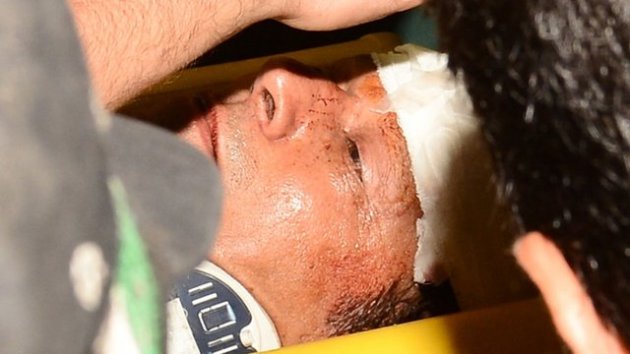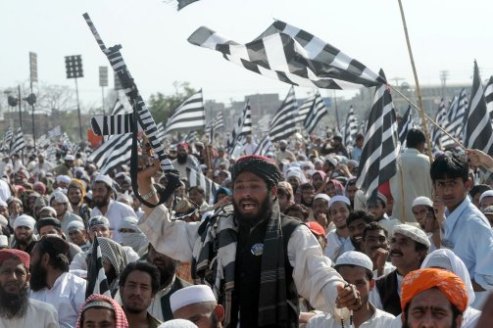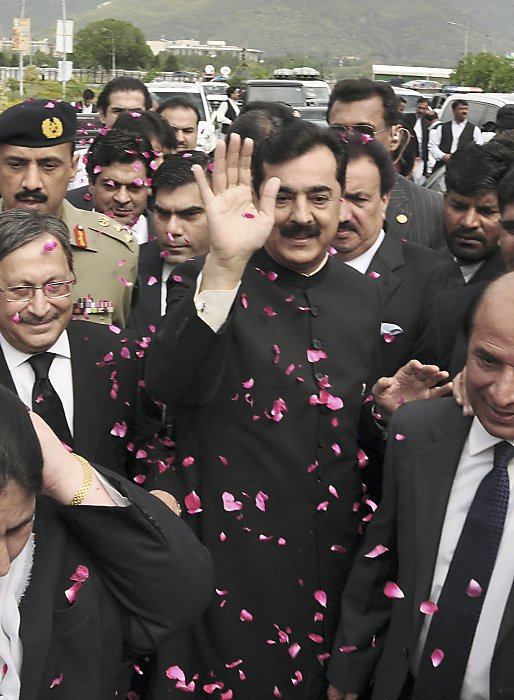By Jon Boone for The Guardian

Imran Khan, a leading candidate in this week’s general election in Pakistan, was rushed to hospital with a skull fracture and injured back on Tuesday after falling off an improvised platform attached to a forklift truck at one of the final rallies of his campaign.
The images of the dazed and bloodied leader of the Pakistan Tehreek-e-Insaf party (PTI) being rushed to hospital with a skull fracture and back injuries has added another element of uncertainty to an election that even seasoned observers are hesitating to call.
But just hours after falling from an overcrowded platform attached to a forklift truck, Khan was recording video messages from his hospital bed, urging his countrymen to vote for his party in the coming polls on Saturday.
“I did whatever I could for this country,” Khan said while lying flat on a hospital bed, his neck partially restrained by a brace. He went on to urge people to vote for the PTI.
“Now I want you to take responsibility. If you want to change your destiny, I want you to take responsibility.”
Earlier yesterday the 60-year-old politician had been pulled off the platform used to raise him to a stage at a political rally in the city of Lahore after one of his guards lost balance and toppled over the side.
The accident triggered a flood of concern and support on social media, where Khan already has a passionate following.
Crowds gathered outside the Shaukat Khanum hospital, a private cancer hospital named after his mother that Khan established, after he was transferred there.
When news came through that a scan had shown Khan had not suffered internal bleeding, the gathered supporters cheered and waved cricket bats, the official symbol of the PTI which will appear on ballot papers next to candidates’ names.
The extraordinary twist to an already drama-filled election complicates the guessing game over how many seats the PTI, a relatively young party that has only ever held one seat in the past, will win.
Although most analysts do not think the PTI will emerge as the biggest party, Khan had appeared to be gaining momentum in recent days with a frantic schedule of back-to-back campaign events that have helped to galvanise a young, middle-class fanbase with huge numbers of supporters flocking to his events.
The more seats he wins, the harder it will be for frontrunner Nawaz Sharif, a two-term prime minister who heads a wing of the Pakistan Muslim League (PML-N), to win an outright majority or even enough seats to form a strong coalition.
Sharif’s campaign was quick to respond to events, announcing the cancellation of all campaign events on Wednesday and the dropping of all ads attacking Khan. The country’s interim prime minister, Mir Hazar Khan Khoso, also expressed concern over Khan’s injury and wished him a quick recovery.
Khan’s political rallies have been full of energy but also chaotic at times, with security guards powerless to prevent the PTI leader throwing himself into heaving crowds despite the terrorist attacks that have cast a shadow over the election.
In 2007 the former prime minister Benazir Bhutto was killed after she was attacked by militants. The incident helped her party, the Pakistan Peoples party (PPP), ride to power on a wave of sympathy.
The runup to the elections has been marred by near-daily violence by militants targeting candidates and their election offices.
On Tuesday 12 people were killed and more than 40 injured by a suicide bomb attack on a candidate for Jamiat Ulema-e-Islam, a rightwing religious party, in the north-western province of Khyber Pakhtunkhwa. Later in the day a roadside bomb killed another five people, including the brother of a PPP candidate standing for the provincial assembly.
So far more than 100 people have been killed by the Taliban’s campaign of violence, largely directed against candidates standing for secular parties that back army operations against the militants.
Khan believes the Pakistani army should withdraw from the tribal regions bordering Afghanistan and resolve the conflict through negotiations. He has also been an outspoken opponent of the US drone programme targeting al-Qaida and Taliban militants in northwest Pakistan.
Some of Khan’s supporters, pictured left, took the accident as a good sign, citing the example of the 1992 cricket World Cup, in which Khan led Pakistan to victory despite suffering acute pain in his shoulder.
“Imran Khan won 92 World Cup with a shoulder injury, this time he’ll win Elections 2013 with a head injury,” said one Facebook commenter.
Dr Mohammed Shafiq, who treated Khan after the fall, told Geo News the former all-rounder had received seven stitches to a 15cm wound in his head, but expected him to recover. “He is fully conscious and he was complaining of backache,” he said. “He is fine, but he must have some rest for one or two days.”
“Imran Khan wants his supporters to remain peaceful and united, and he says he will soon be among them,” his sister, Rani Hafiz Khan, told the Pakistani ARY news channel. According to a recent poll by the Pew research centre, 60% of respondents viewed Khan favourably. However that figure was slightly down on a year ago, and now Khan is slightly outranked by Sharif.
The election will mark a historic transfer of power from one democratically elected government fulfilling its full term to another, something that has never happened in Pakistan’s history.



















You must be logged in to post a comment.